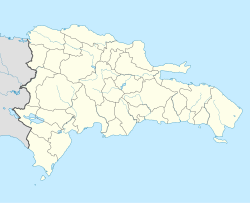
Back Santo Domingo Afrikaans ሳንቶ ዶሚንጎ Amharic Santo Domingo AN Sanct Dominicesburg ANG سانتو دومينغو Arabic سانطو دومينݣو ARY سانتو دومينجو ARZ Santu Domingu AST Santo Domingo (Dominikana) AVK Santo Domingo (Republika Duminikana) Aymara
Santo Domingo | |
|---|---|
| Santo Domingo de Guzmán | |
| Motto(s): "Ciudad Primada de América" (in Spanish) ("First City of America") | |
| Coordinates: 18°28′N 69°57′W / 18.467°N 69.950°W | |
| Country | |
| District | National District |
| Founded | 5 August 1496 (529 years ago) |
| Founder | Bartholomew Columbus |
| Named for | Saint Dominic de Guzmán |
| Government | |
| • Mayor | Carolina Mejía |
| Area | |
• Total | 1,502 km2 (580 sq mi) |
| • Metro | 2,770.00 km2 (1,069.50 sq mi) |
| Elevation | 14 m (46 ft) |
| Population (November 2022) | |
• Total | 1,029,110[1] |
| • Density | 680/km2 (1,800/sq mi) |
| • Urban | 1,029,110 |
| • Metro | 4,274,651[a][5] |
| Demonym | Spanish: Capitaleño (fem. Capitaleña) |
| Metro area GDP (PPP, constant 2015 values) | |
| • Year | 2023 |
| • Total | $73.7 billion[6] |
| • Per capita | $20,900 |
| Time zone | UTC−04:00 (AST) |
| Postal codes | 10100–10699 (Distrito Nacional) |
| Area codes | 809, 829, 849 |
| Website | adn (in Spanish) |
| Official name | Colonial City of Santo Domingo |
| Type | Cultural |
| Criteria | ii, iv, vi |
| Designated | 1990 (14th session) |
| Reference no. | 526 |
| Region | Latin America and the Caribbean |
Santo Domingo (Spanish pronunciation: [ˈsanto ðoˈmiŋɡo] meaning "Saint Dominic" but verbatim "Holy Sunday"), once known as Santo Domingo de Guzmán, known as Ciudad Trujillo between 1936 and 1961, is the capital and largest city of the Dominican Republic and the largest metropolitan area in the Caribbean by population.[7] As of 2022,[update] the city and immediate surrounding area (the Distrito Nacional) had a population of 1,029,110 while the total population is 3,798,699 when including Greater Santo Domingo (the "metropolitan area"). The city is coterminous with the boundaries of the Distrito Nacional ("D.N.", "National District"), itself bordered on three sides by Santo Domingo Province.[8][9]
Founded by the Spanish in 1496, on the east bank of the Ozama River and then moved by Nicolás de Ovando in 1502 to the west bank of the river, the city is the oldest continuously inhabited European settlement in the Americas, and was the first seat of the Spanish colonial rule in the New World, the Captaincy General of Santo Domingo. It is the site of the first university, cathedral, castle, monastery, and fortress in the New World. The city's Colonial Zone was declared as a World Heritage Site by UNESCO.[10][11] Santo Domingo was called Ciudad Trujillo (Spanish pronunciation: [sjuˈðað tɾuˈxiʝo]), from 1936 to 1961, after the Dominican Republic's dictator, Rafael Trujillo, named the capital after himself. Following his assassination, the city resumed its original designation.
Santo Domingo is the cultural, financial, political, commercial and industrial center of the Dominican Republic, with the vast majority of the country's most important industries being located within the city. Santo Domingo also serves as the chief seaport of the country. The city's harbor at the mouth of the Ozama River accommodates the largest vessels, and the port handles both heavy passenger and freight traffic.[12]
- ^ "Provincias Dominicanas" (PDF). Retrieved 18 September 2023.
- ^ (in Spanish) Superficies a nivel de municipios, Oficina Nacional de Estadística Archived 17 November 2014 at the Wayback Machine
- ^ De la Fuente, Santiago (1976). Geografía Dominicana (in Spanish). Santo Domingo, Dominican Republic: Editora Colegial Quisqueyana.
- ^ "Carlos Guzmán es electo como presidente de la Mancomunidad del gran Santo Domingo" (in Spanish). Ayuntamiento de Santo Domingo Norte. Retrieved 1 February 2024.
- ^ "Informe básico XCPV". Retrieved 1 February 2024.
- ^ "TelluBase—Dominican Rep. Fact Sheet (Tellusant Public Service Series)" (PDF). Tellusant. Retrieved 11 January 2024.
- ^ Bourne, Kevin. "Local government in the Caribbean". City Mayors. Archived from the original on 6 April 2023.
- ^ "Distrito Nacional (National District, Dominican Republic) - Population Statistics, Charts, Map and Location". www.citypopulation.de. Retrieved 17 December 2024.
- ^ Corripio, Grupo de medios (2 December 2023). "Gran Santo Domingo con 3.7 millones personas". Hoy Digital (in Spanish). Retrieved 17 December 2024.
- ^ Cite error: The named reference
whc.unesco.orgwas invoked but never defined (see the help page). - ^ "Comisión Nacional Dominicana para la UNESCO". UNESCO. Archived from the original on 9 August 2020.
- ^ Statistics, Statistics. "Statistics 2019" (PDF).
Cite error: There are <ref group=lower-alpha> tags or {{efn}} templates on this page, but the references will not show without a {{reflist|group=lower-alpha}} template or {{notelist}} template (see the help page).






